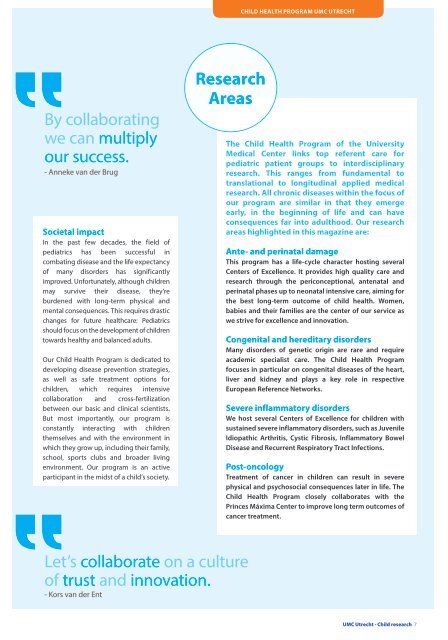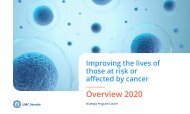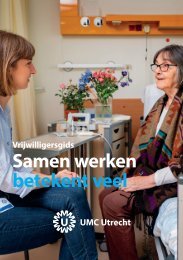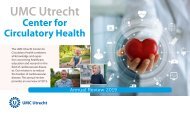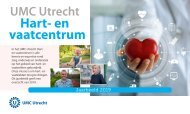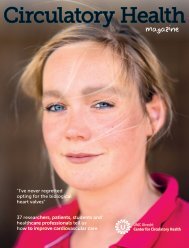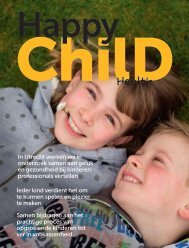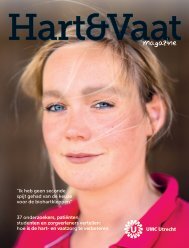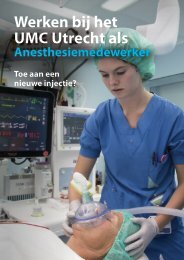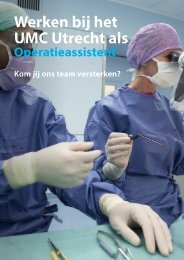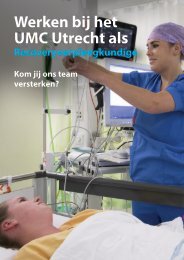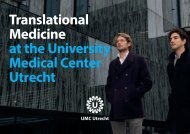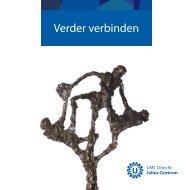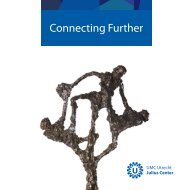Child research
Create successful ePaper yourself
Turn your PDF publications into a flip-book with our unique Google optimized e-Paper software.
CHILD HEALTH PROGRAM UMC UTRECHT<br />
By collaborating<br />
we can multiply<br />
our<br />
<br />
success.<br />
- Anneke van der Brug<br />
Societal impact<br />
In the past few decades, the field of<br />
pediatrics has been successful in<br />
combating disease and the life expectancy<br />
of many disorders has significantly<br />
improved. Unfortunately, although children<br />
may survive their disease, they’re<br />
burdened with long-term physical and<br />
mental consequences. This requires drastic<br />
changes for future healthcare: Pediatrics<br />
should focus on the development of children<br />
towards healthy and balanced adults.<br />
Our <strong>Child</strong> Health Program is dedicated to<br />
developing disease prevention strategies,<br />
as well as safe treatment options for<br />
children, which requires intensive<br />
collaboration and cross-fertilization<br />
between our basic and clinical scientists.<br />
But most importantly, our program is<br />
constantly interacting with children<br />
themselves and with the environment in<br />
which they grow up, including their family,<br />
school, sports clubs and broader living<br />
environment. Our program is an active<br />
participant in the midst of a child’s society.<br />
<br />
Research<br />
Areas<br />
The <strong>Child</strong> Health Program of the University<br />
Medical Center links top referent care for<br />
pediatric patient groups to interdisciplinary<br />
<strong>research</strong>. This ranges from fundamental to<br />
translational to longitudinal applied medical<br />
<strong>research</strong>. All chronic diseases within the focus of<br />
our program are similar in that they emerge<br />
early, in the beginning of life and can have<br />
consequences far into adulthood. Our <strong>research</strong><br />
areas high lighted in this magazine are:<br />
Ante- and perinatal damage<br />
This program has a life-cycle character hosting several<br />
Centers of Excellence. It provides high quality care and<br />
<strong>research</strong> through the periconceptional, antenatal and<br />
perinatal phases up to neonatal intensive care, aiming for<br />
the best long-term outcome of child health. Women,<br />
babies and their families are the center of our service as<br />
we strive for excellence and innovation.<br />
Congenital and hereditary disorders<br />
Many disorders of genetic origin are rare and require<br />
academic specialist care. The <strong>Child</strong> Health Program<br />
focuses in particular on congenital diseases of the heart,<br />
liver and kidney and plays a key role in respective<br />
European Reference Networks.<br />
Severe inflammatory disorders<br />
We host several Centers of Excellence for children with<br />
sustained severe inflammatory disorders, such as Juvenile<br />
Idiopathic Arthritis, Cystic Fibrosis, Inflammatory Bowel<br />
Disease and Recurrent Respiratory Tract Infections.<br />
Post-oncology<br />
Treatment of cancer in children can result in severe<br />
physical and psychosocial consequences later in life. The<br />
<strong>Child</strong> Health Program closely collaborates with the<br />
Princes Máxima Center to improve long term outcomes of<br />
cancer treatment.<br />
Let’s collaborate on a culture<br />
of trust and innovation.<br />
- Kors van der Ent<br />
UMC Utrecht - <strong>Child</strong> <strong>research</strong> 7


